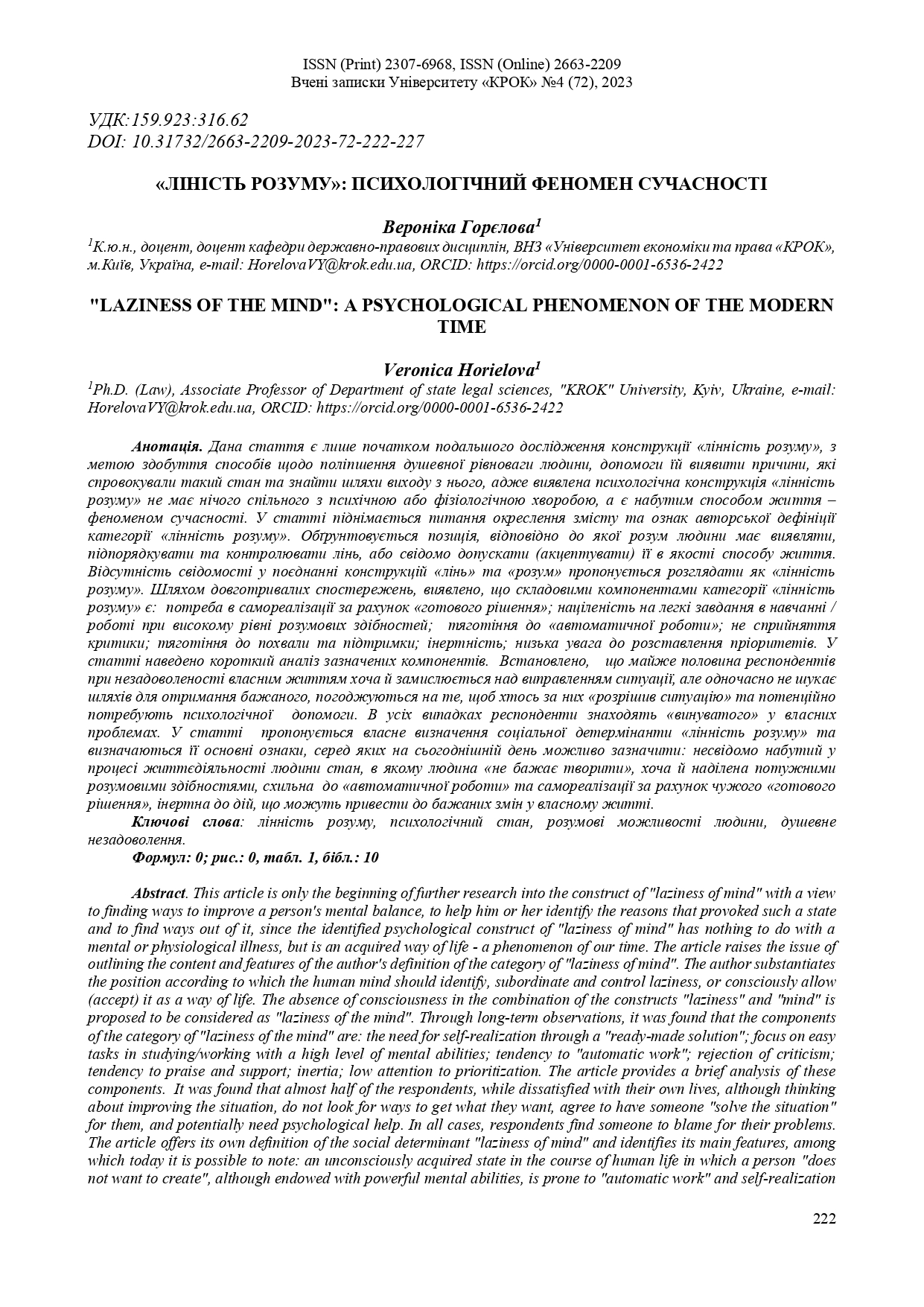"LAZINESS OF THE MIND": A PSYCHOLOGICAL PHENOMENON OF THE MODERN TIME
DOI:
https://doi.org/10.31732/2663-2209-2023-72-222-227Abstract
This article is only the beginning of further research into the construct of "laziness of mind" with a view to finding ways to improve a person's mental balance, to help him or her identify the reasons that provoked such a state and to find ways out of it, since the identified psychological construct of "laziness of mind" has nothing to do with a mental or physiological illness, but is an acquired way of life - a phenomenon of our time. The article raises the issue of outlining the content and features of the author's definition of the category of "laziness of mind". The author substantiates the position according to which the human mind should identify, subordinate and control laziness, or consciously allow (accept) it as a way of life. The absence of consciousness in the combination of the constructs "laziness" and "mind" is proposed to be considered as "laziness of the mind". Through long-term observations, it was found that the components of the category of "laziness of the mind" are: the need for self-realization through a "ready-made solution"; focus on easy tasks in studying/working with a high level of mental abilities; tendency to "automatic work"; rejection of criticism; tendency to praise and support; inertia; low attention to prioritization. The article provides a brief analysis of these components. It was found that almost half of the respondents, while dissatisfied with their own lives, although thinking about improving the situation, do not look for ways to get what they want, agree to have someone "solve the situation" for them, and potentially need psychological help. In all cases, respondents find someone to blame for their problems. The article offers its own definition of the social determinant "laziness of mind" and identifies its main features, among which today it is possible to note: an unconsciously acquired state in the course of human life in which a person "does not want to create", although endowed with powerful mental abilities, is prone to "automatic work" and self-realization at the expense of someone else's "ready-made solution", and is inert to actions that can lead to the desired changes in his or her own life.
Downloads
References
Гайда, Т.(2023). Лінності як проказа духу. URL: http://surl.li/outar Дата звернення 9.11.2023
Горбань, Р. (2017). Розум як складова структури особи у філософсько-релігійному вченні Чеслава Станіслава Бартніка Вісник Львівського університету. Серія філос.-політолог.студії. Вип.12, 48-54.
Денисенко, А.А.(2019). У Психолога. URL: http://surl.li/outby Дата звернення 10.11.2023
Еліаде, М.(2001). Священне і мирське. Міфи, сновидіння і містерії. Мефістофель і Андрогін Окультизм, ворожбитство та культурні уподобання. 592 с.
Качмар, С.(2016). Л. Проблема співвідношення віри і розуму в східній патристиці: історико-філософський і логіко-структурний аналіз. Дис. Канд.філософських наук. Львів, 190 с.
Коханова, О.П. (2016). Історія психології: від античності до початку XX століття : навч. посібник .Авт-уклад. НВП «Інтерсервіс». 235 с.
Проскура, Ю.В. (2011). Дослідження зв’язку ліні з факторами «Великої п’ятірки». Вісник Дніпропетровського університету економіки та права імені Альфреда Нобеля. Серія «педагогіка і психологія». № 1 (1). URL: http://surl.li/outco Дата звернення 17.10.2023.
ПСИХОЛОГІС. (2022). Енциклопедія практичної психології. URL: http://surl.li/outbd Дата звернення 12.11.2023
Словник.юа (2005-2024). Словник української мови. URL: http://surl.li/outah Дата звернення 17.10.2023.
Taylor C. edited by Coakley S. John Wiley & Sons. (2012). Reason, Faith, And Meaning Faith, Rationality and the Passions. 272 p.

Downloads
Published
How to Cite
Issue
Section
License

This work is licensed under a Creative Commons Attribution-NonCommercial 4.0 International License.

